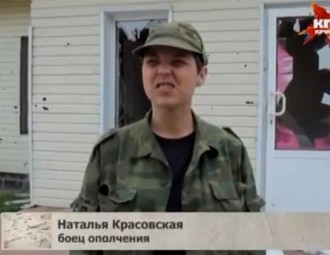Belarusan Foreign Ministry didn’t formally confirm the death of sniper Natalia in Ukraine

Belarusan Embassy in Kiev didn’t get any information about the death of Barysau citizen Natalia Krasouskaja from the Ukrainian authorities or relatives.
“No information from the official Ukrainian authorities or appeals from the relatives to our Embassy in Kiev”, - commented Belarusan Foreign Ministry's spokesman Dzmitry Mironchyk on the information that appeared in the Internet.
Barysau inhabitant Natalia Krasouskaja joined terrorists in May and fought in Slavyansk and near Donetsk, becoming the most famous Belarusan in the pro-Russian camp. A few videos of her have appeared online, videos where she claimed she is from Barysau, Minsk region, and came to Ukraine back on 5 May to support the separatist forces.
Showing her Belarusan passport and addressing Lukashenka, in one video she proclaimed that the Donetsk People's Republic had the backing of the Belarusan people. Krasouskaja also noted in a later dispatch, the Belarusan KGB had called her mother to inform her that they have filed a criminal case against her. She added that other Belarusan nationals in the DNR paramilitary army have also gotten word that criminal cases were opened against them.
Krasouskaja was reported dead on August 26. She was killed during the assault of Yelenovka to the south of Donetsk. There is a photo probably showing the Belarusian’s body.
Natalia Krasouskaja was in the column of militants attacked by Ukrainian troops.
-
03.01
-
07.10
-
22.09
-
17.08
-
12.08
-
30.09



























